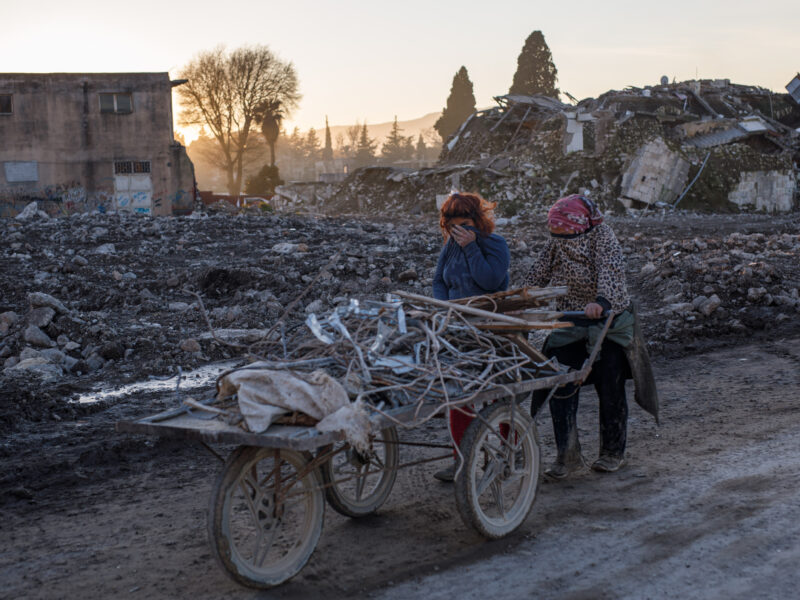The Minister of Higher Education branded academics “Islamo-leftists,” claiming they bear responsibility for terror attacks.
When France’s Minister of Higher Education and Research, Frederique Vidal, announced last month that free, environmentally friendly period products would be made available on French campuses, the news generated ample national and international media coverage. This measure must be recognized as a victory for French student unions, which have long campaigned against period poverty. Yet, a good news story about the country’s campuses is also what the center-right ruling party, La République en Marche, needs right now to distract us from the reality of what the government is doing to French universities—which is far more sinister.
In recent years, Paris has engaged in frontal attacks on academic freedom. Austerity measures have eroded universities, with students and staff struggling with deteriorating working and learning conditions. A controversial new higher education law is set to damage academic autonomy and quality by consolidating short-term employment and funding, and the role of private companies.
Most recently, the French government has decided to turn public universities into a battleground on which to wage a culture war ahead of the April 2022 presidential elections—where they will likely try and appeal to the far right. Feeding into public antagonism toward Muslims, Vidal has attacked so-called “Islamo-leftists” in universities, claiming that academics engaged in race, postcolonial, and gender studies, bear responsibility for terrorist attacks against France. Last month, Vidal called for an investigation into academic research that feeds “Islamo-leftist’’ tendencies that “corrupt society.’’ This caused a general outcry in academia and it remains unclear whether this ludicrous exercise will happen.
But in a context of socio-economic distress and social anxiety due to the pandemic, the government’s inflationary use of the term helps build an imagined “enemy of the interior,” a treacherous intellectual elite responsible of the country’s ills. The scholars under attack are actually doing critical work in helping us understand the complex mechanisms that perpetuate sexism, racism and class and how they intersect. The official call for a purge of French academia can only raise deep concerns among those who consider academic freedom and intellectual inquiry to be core pillars of a democratic society.
At the same time, the impoverishment of French public universities has continued, carrying with it a deleterious impact on academic autonomy and students’ life. The free period products campaign will cost €15 million ($18 million) a year—a cheap price to buy a progressive reputation and social peace on campus. By comparison, the Union des Etudiants de France (UNEF), one of France’s student unions, has been calling for a €1.5 billion emergency plan to address student poverty.
Compared to the astronomical cost of higher education in the United States, French universities are inexpensive; annual tuition ranges between between €170 to €600 ( $204-$720), depending on the degree. But the principle of free education has been enshrined in the French constitution since 1946, recognized by the state as a duty to its citizens and an integral aspect of the post-WWII social contract. Anyone who completes a Baccalaureate (high school matriculation) is entitled to attend university. While the most prestigious universities remain selective and elite, low tuition fees have had the effect of narrowing socio-economic gaps. This is why French society remains strongly attached to the “free university” principle and has resisted the government’s decades-long ambition to shift to a high tuition system like the one in the United States. And yet, even with low or free tuition, student poverty is today a stark reality in France: about 20 percent of students live below the poverty line, while 46 percent are seeing their academic work suffer because they have been forced to take jobs to compensate for the severe cuts to once-adequate state financial aid.
In face of the deterioration of their learning and living conditions, student anger is brewing. Last year, a student in Lyon set himself on fire in Lyon to protest academic poverty. Over the past two decades of budget austerity, academics’ working conditions have also steadily worsened. The recruitment of permanent academic staff has been minimal while student numbers have increased very fast. Rather than ramp up university support, though, some €6 billion of public funding are annually paid to private companies to support their R&D efforts through the Research Tax Credit, with very limited impact on France’s research achievements.
Vidal’s new Higher Education and Research Law, adopted in December despite the academic community’s quasi-unanimous rejection, will deepen the inequalities between a few well-resourced institutions and the majority of cash-strapped universities.
The law increases the number of early-career academic staff who are forced to work as adjuncts rather than staff with benefits; it also reinforces the funding of public research through short-term projects and commercial companies. This will have a damaging impact on academic autonomy and quality.
All of this, meanwhile, is playing out while France grapples with a series of sexual harassment and rape cases that have damaged the reputation of prestigious higher education institutions.,
Academics and students have been calling on the government and university leadership to challenge the power structures that allow for the systemic entrenchment of sexism within French universities. So far, their demands have been met with little response.
Anti-intellectualism, scapegoating of the academic community, and chipping away at university freedom are hardly new or unique to France. These are, indeed, a cornerstone of authoritarian governments, who deploy discursive and legal tactics in order to stifle dissent and free inquiry on campus. Now, as these wars increasingly reach democratic fronts, we must oppose them.
Of course, I am in favor of free period products in universities and schools, but why did France’s universities have to wait for 2021 to receive this benefit? French public universities are an essential public service dedicated to fostering human understanding through open-ended enquiry. They are an instrument of social mobility for many working class youth. They also add to France’s influence on the world stage. As the government dismantles these crucial institutions, we should not allow opportunist politicians to use free tampons as a fig leaf for their actions.



